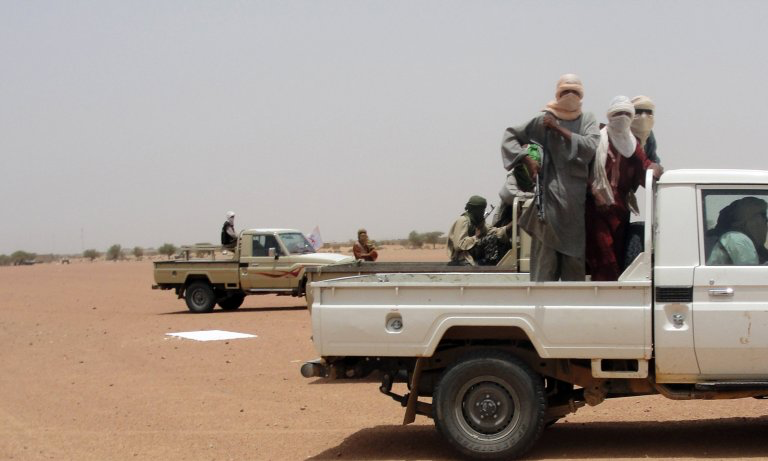By Owen Oppenheimer
DOI: 10.57912/25621578
In recent years the Sahel region of North Africa has experienced an eruption of violence from non-state armed groups (NSAGs). Previously stable nations such as Burkina Faso, then under President Blaise Campaoré, have experienced a drastic rise in violence since a 2014 coup deposed Campaoré. This period of uncertainty has led to the formation of Burkina Faso’s first home-grown radical jihadist group – the Ansaroul Islam. Support for the organization amongst dissatisfied marginalized communities along with its goal of toppling existing ruling powers, makes it a classic example of a guerilla insurgent group threatening regional stability.
Founded by Imam Ibrahim Malam Dicko as an extension of his religious association (Al-Irchad), Ansaroul Islam was first recognized by regional authorities in 2012 after Dicko amassed a sizable following through his anti-establishment rhetoric. He appealed to ethnic tensions between the majority Fulani and minority Rimaibé groups. Arguing that the population of Soum Province of Burkina Faso was being exploited by the majority Fulani aristocracy, Ansaroul Islam quickly became the predominant religion of members of the Rimaibé ethnic group. The ideology places an emphasis on toppling the existing state and rebuilding Djeelgodji––a powerful Fulani empire ended by French colonization. While the group's rhetoric had previously been non-violent, a 2016 declaration of a state of emergency in Soum Province prompted Dicko to convert his populist movement into a violent armed force. To achieve their overall goal of gaining power and recreating Djeelgodji, Ansaroul Islam has a well-documented set of tactics, techniques, and procedures (TTP). The largest targets of the group have been civilians and civilian infrastructure. Over 75 attacks have been reported, involving kidnappings, assassinations, and the destruction of public buildings. Military targets have been the focus of 30 recorded attacks, predominantly intended to damage security forces and local leaders’ ability to respond to the violence. Victims have included village chiefs, councilmen, rival imams, and marabouts, as well as checkpoints or outposts of Burkinabe security forces. Notably, the group has been observed acting as a community self-defense force, protecting communities that support them and from violence and bandits. Ironically, the group also engages in banditry to support itself.
Despite appearing as a predominantly guerilla or insurgent group, Ansaroul Islam supporters represent a minority of the overall population in the Soum region, and in Burkina Faso as a whole. The group’s strategy of targeting government infrastructure to reinforce its state abandonment narrative, along with its extensive history of violence against civilians, has not made it popular. Similarly, its failure to provide social services in regions now cut off from the state has resulted in the loss of existing support in most areas. In 2017 after Ibrahim Malam Dicko died, leadership was assumed by his unpopular ill-tempered brother Jafar Dicko. The combination of falling popular support and an inexperienced leader further threatens the group's future as well as their identity as a popular guerilla organization. In fact, it is suspected that since these events many insurgents have defected to rival Islamist groups Macina Liberation Front (FLM) and Islamic State in the Greater Sahara (ISGS).
While the group has nearly collapsed, its rapid rise and fall highlight the chronic political instability that has become characteristic of the Sahel region. This insecurity represents a grave threat to the United States’ interests, bases, and security strategy in the region. Basing agreements are contingent on a stable government and secure environment and with only one base in the Sahel it is of the utmost importance the U.S. helps foster that very environment. In order to maintain an effective presence in the Sahel, the US must not fail to support friendly governments lest it risks actors like the Russian Federation or China stepping up to do it for them. In order to do this there needs to be an effort to shift local governments from response to prevention, integrate security and governance, and increase focus on financing for women and youth in support of economic stability. There also needs to be a constant review of monitoring, evaluation, and learning (MEL) efforts to make strategic shifts to the plan as necessary. However, with a lack of public attention and a rising interest in isolationism progress is slow. With these changes there is hope to keep the Sahel as the bedrock of American security in the MENA region and a palace that will be a bulwark against adversarial influence in the coming great power competition of this century.


Comments